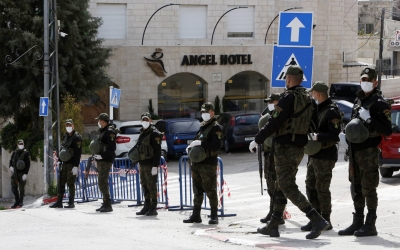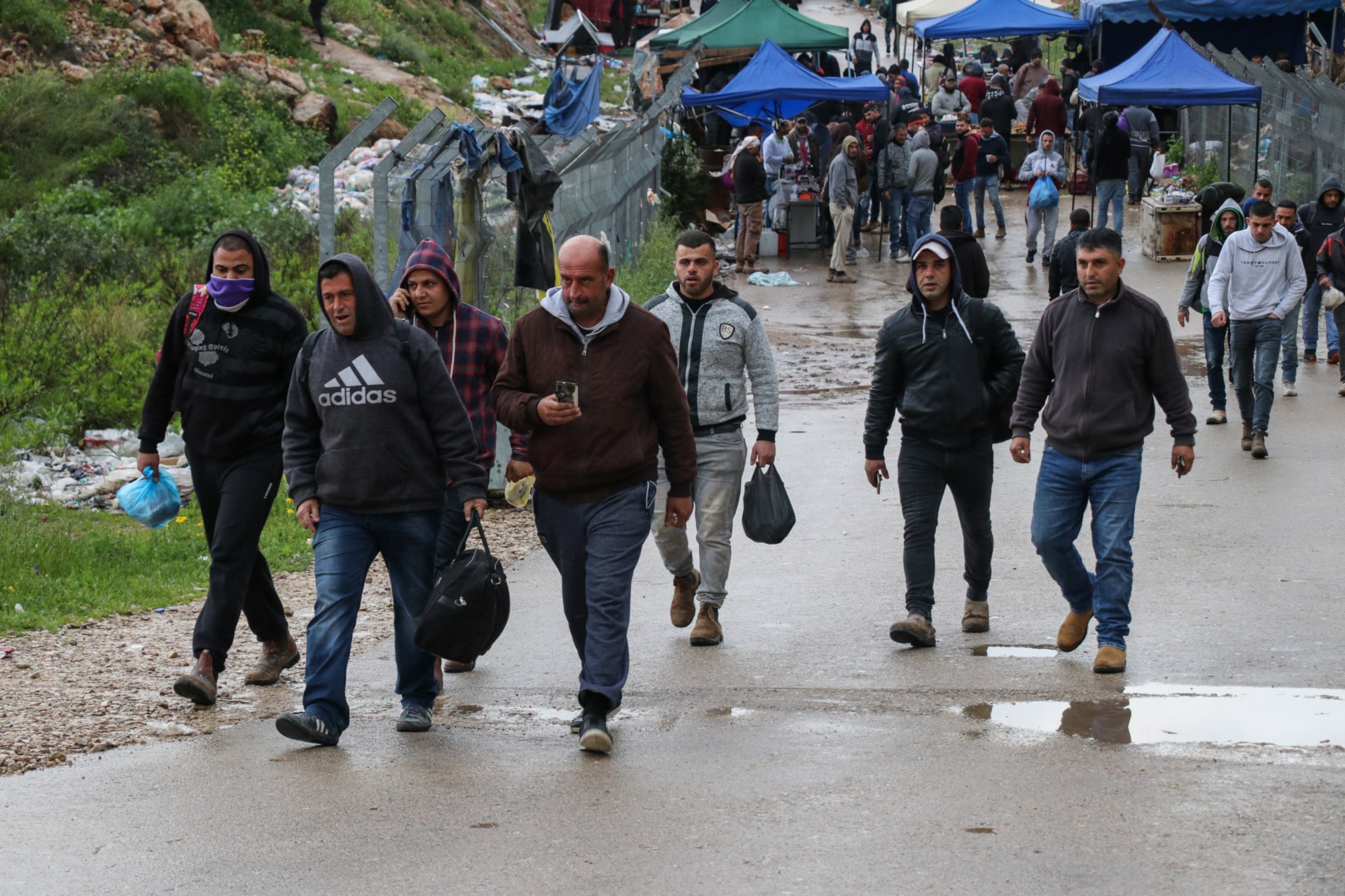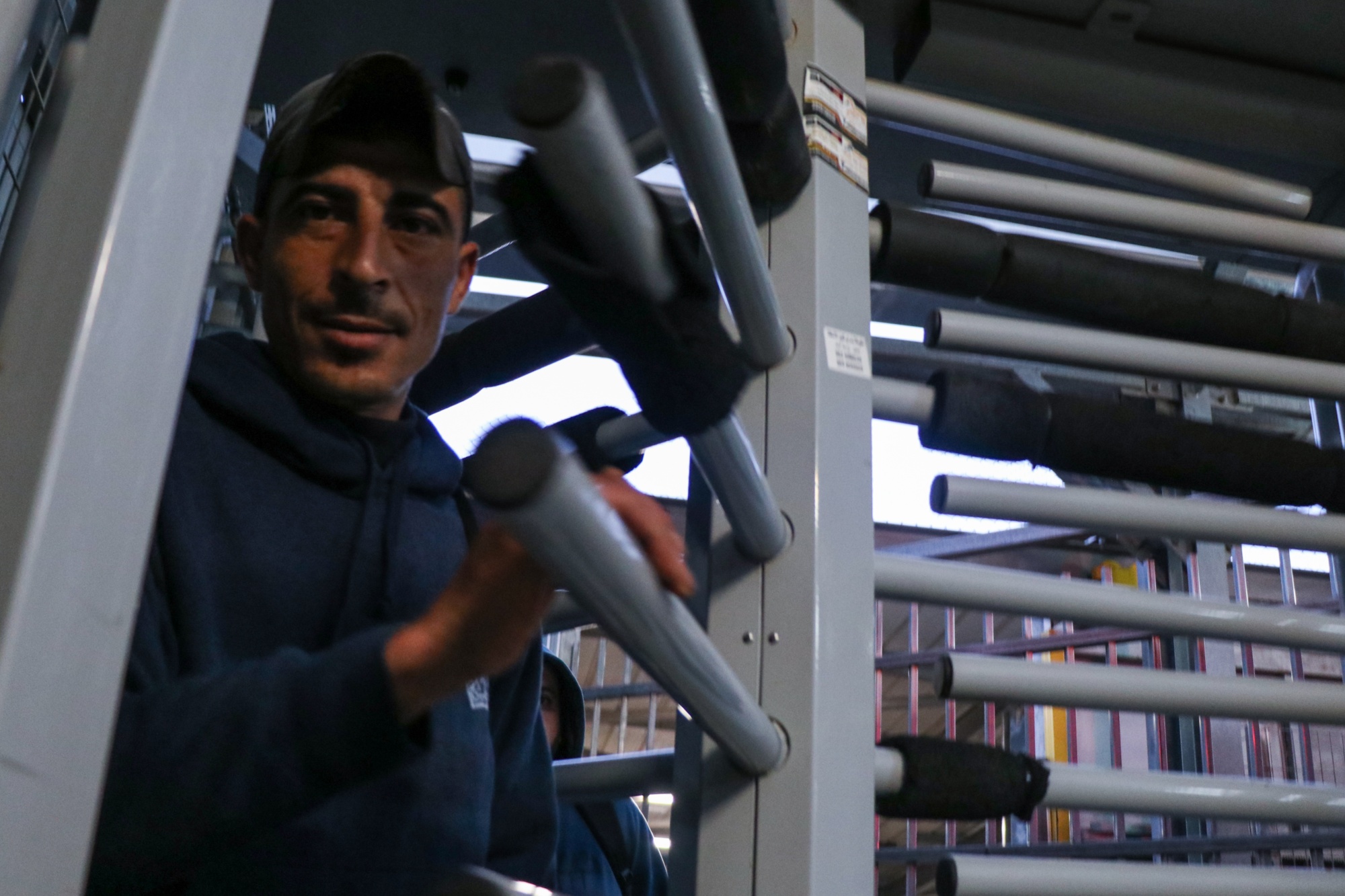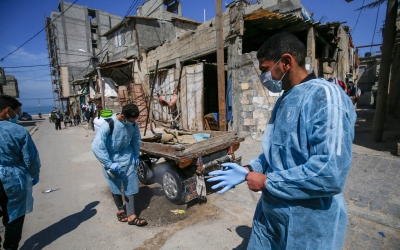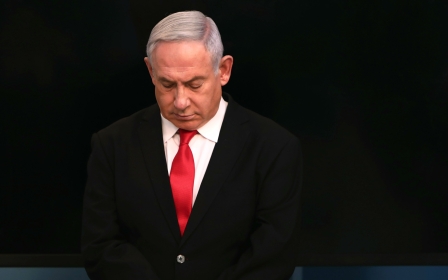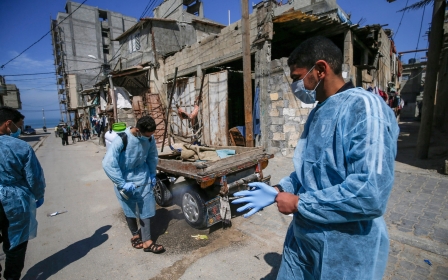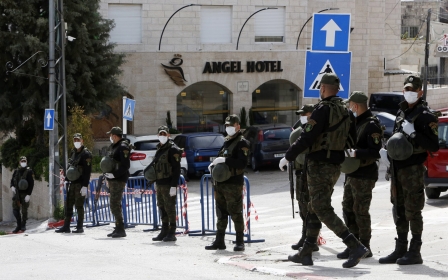Coronavirus: Palestinian workers face difficult choice between livelihood and isolation
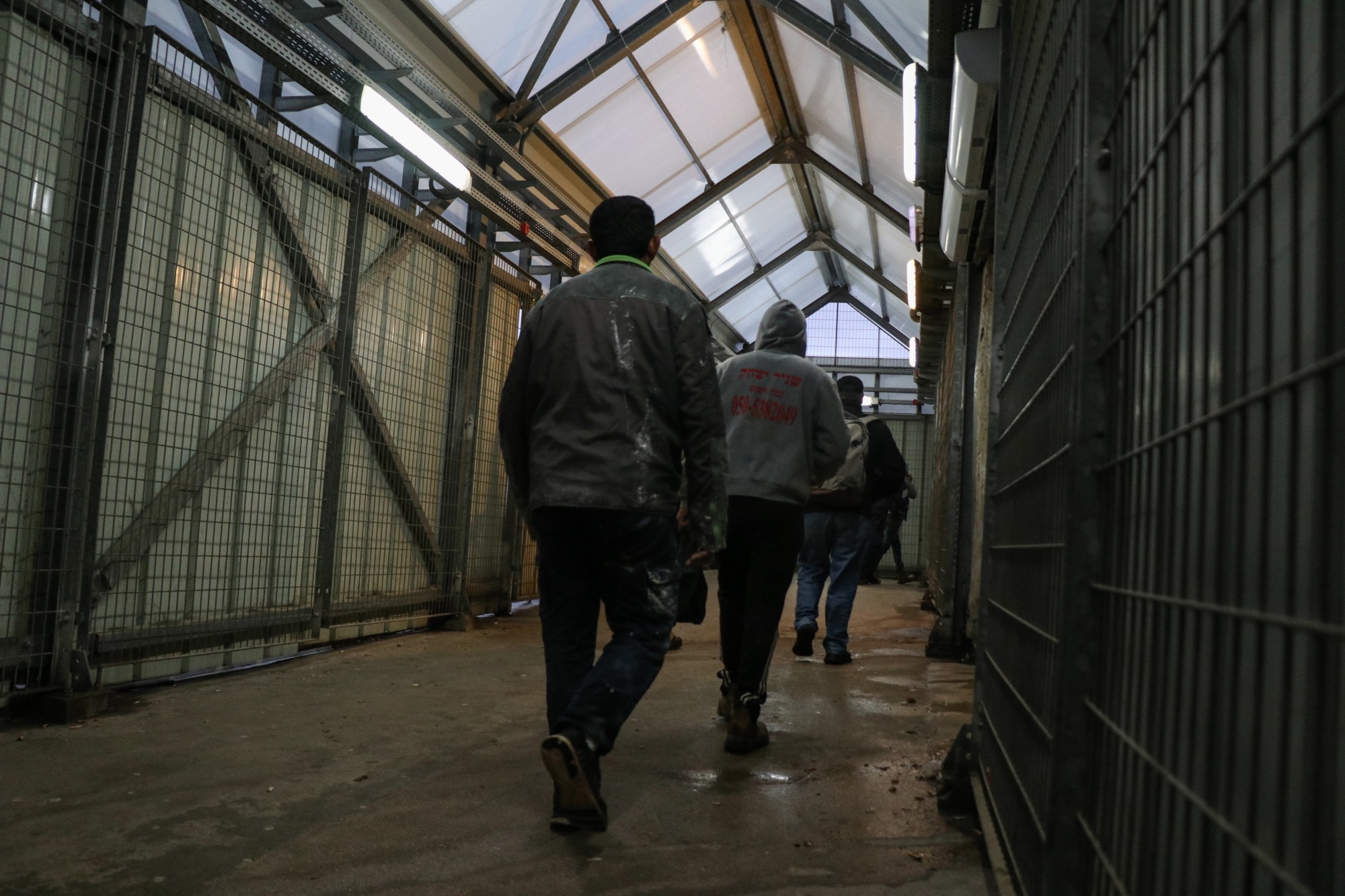
When the first case of the novel coronavirus, or COVID-19, was confirmed in the occupied West Bank city of Bethlehem, an immediate sense of panic overwhelmed the small city.
As schools, universities, and businesses began to shut down, thousands of the city’s residents retreated to their homes in anticipation of what would happen next.
New MEE newsletter: Jerusalem Dispatch
Sign up to get the latest insights and analysis on Israel-Palestine, alongside Turkey Unpacked and other MEE newsletters
But as the city limits were shut off and nearby checkpoints with Israel started to close, a new sense of anxiety began to set in - this time, for the city’s thousands of labourers who work inside Israel.
“The state of emergency was announced on Thursday (5 March), and by the time the weekend was over, everything had changed,” Kareem A, a 51-year-old construction worker from Bethlehem, told Middle East Eye.
The spread of the coronavirus in both Israel and the West Bank has had a profound impact on the Palestinian workforce inside Israel - with the latest restrictions forcing Palestinian workers to choose between months-long separation from their families - or financial ruin.
New restrictions
Kareem had seen reports saying that Israel had closed Checkpoint 300, the main point of entry to Israel for thousands of Palestinian workers from the entire southern West Bank.
“I decided to try and cross anyways, hoping that they would make exceptions for the workers,” he said. But Kareem and hundreds of his fellow-labourers were turned around and sent back home.
“We hoped that it would only be a temporary thing until they figured out a way to let the Bethlehem workers in,” he said, “but it’s looking like it will be a much longer-lasting problem.”
While labourers from Bethlehem have been stuck at home since 5 March, tens of thousands of Palestinian workers from the other districts across the West Bank have been travelling across the Green Line relatively unchecked.
The first coronavirus case outside of Bethlehem was confirmed last week in the northern district of Tulkarem. The patient was a labourer who worked in Israel.
As the virus continued to spread across Israel and the West Bank, both Israel and the Palestinian Authority (PA) began placing more and more restrictions on movement inside and between the territories.
On Tuesday, Israeli Defence Minister Naftali Bennett - who made the initial decision to close the checkpoints around Bethlehem - announced a set of even heavier restrictions on Palestinian labourers coming from other parts of the West Bank.
Bennett restricted entry to labourers he classified as working in “essential” fields, like construction, healthcare, and agriculture. Everyone else would have to stay at home for the foreseeable future.
In a shocking move, Bennett announced that any labourers who did decide to continue working in Israel would be mandated to stay there and would be unable to travel back home for at least one or two months.
Palestinian labourers were given three days to make a decision: go into work and be separated from their families indefinitely, or stay at home, unable to make a living. Regardless of what they decided, in three days, the borders would be closed on both sides.
It remained unclear if the same exceptions would be extended to workers from Bethlehem, as the checkpoints between Israel and the city remain closed.
The news came as a shock to both Israeli officials who see it as posing a major “security threat”, and Palestinians, whose work permits usually do not allow them to ever stay overnight in Israel.
“I decided to take the risk and come stay here because I don’t really have another choice,” Wael A, a labourer from Bethlehem, told MEE.
Wael crossed into Israel unlawfully from Bethlehem last week, along with a friend and a number of other workers.
“We didn’t know how long the quarantine in Bethlehem was going to last, and we needed to feed our families,” he said, adding that workers, typically those without permits, often stay in Israel overnight illegally to avoid the risk of passing through checkpoints on a daily basis.
‘I can’t afford to be stuck in Bethlehem right now’
- Wael A, Palestinian labourer
At the time, Wael couldn’t have imagined that Israel was going to allow workers to stay for an extended period of time in the country, with proper lodging provided at the expense of the employer.
Wael and his friend have been sleeping at the construction site where they work, but hope that they can retroactively "legalise" their stay, and get proper accommodations.
However, he said they feared that if Israeli authorities see “Bethlehem” on their ID cards, they would be sent back home.
“I have house payments, car payments, and three children to feed,” he said. “I can’t afford to be stuck in Bethlehem right now.”
‘Israel needs us’
The risks of permitting Palestinians to work in Israel and eventually go back home may appear to outside observers to be far too great during a pandemic.
But to Palestinians, the move isn’t a surprising one at all.
“Israel cannot survive this [pandemic] without the Palestinian workers,” Kareem told MEE. “Their economy is far too dependent on us to simply not allow workers in.”
An estimated 120,000 Palestinians, both with and without permits, are believed to work in Israel, making up a significant and cheap workforce mainly in the construction and agricultural sectors.
“While the Israelis are staying inside their homes, they are putting us to work so that things don’t collapse,” Kareem continued.
Kareem said he believed Israel would “without a question” risk the health of the Palestinian labour force, “for the sake of saving their economy.”
“They are allowing Palestinians to go put their lives at risk, while they tell Israelis to stay at home and stay safe.”
Economic disaster and no safety net
For the workers still stuck in Bethlehem, the future seems bleaker every day.
“Every day without work is another we come closer to financial disaster,” Kareem told MEE from his home in a local refugee camp.
Kareem, a husband and father of four, is the sole provider for his family of six. On a good month, Kareem makes around 250 shekels ($65) a day, 20 percent of which goes to daily meals and transportation to and from his work outside Tel Aviv.
But, he notes, “the past few months leading up were filled with Jewish holidays and bad weather, so we didn’t have a lot of work at the construction sites”.
“So it’s not like I have savings that I can rely on to carry us through the month,” he said. “No work means no money.”
Since he has been unable to go to work, Kareem says he’s been receiving messages from his Israeli employer threatening to give his job to someone else, and therefore revoke his permit.
“They want to keep making money, and they can’t do that with workers from Bethlehem,” he said, adding that a number of employers have cut Bethlehem labourers loose and replaced them with Palestinian workers from elsewhere in the West Bank.
If enough workers chose to go and stay in Israel for the next two months, he fears his job will be at an even bigger risk.
“I have begged them to not take my name off the employee list, but I don’t know what they will do.”
Health concerns
Even with so much at risk for workers and their families, the primary concern for most Palestinians remains their personal health and the health of their community.
Prior to Bennett’s announcement on Tuesday, many in the West Bank feared the risks that workers might bring the virus in from Israel, which has a significantly higher rate of coronavirus infections than the Palestinian territory.
‘I’d rather get sick than let my family starve or have the bank come after us’
- Wael A, Palestinian labourer
“As a worker, it was scary to know that we were going into Israel,” Wael told MEE. “Obviously no one wants to get sick, and then risk carrying it back to their families and their community.”
But it was a risk that Wael said he had to take.
“Neither our government nor the Israeli government protects our rights as labourers in Israel,” he said. “I’d rather get sick than let my family starve or have the bank come after us.”
With the new measures announced on Tuesday, however, local health experts are hoping the economic strain on Palestinian workers can be partially alleviated while maintaining strict public health guidelines.
“We are sceptical about the labourers going to Israel to work because it does increase the chance of them bringing the virus back here and spreading it,” Dr Imad Shahadeh, the head of the PA Ministry of Health’s Bethlehem division, told MEE.
But, he said, allowing the workers to stay inside Israel in designated housing does reduce some of that risk.
“It is a good measure to prevent the spread of the virus,” Shahadeh said, adding that he hopes that the workers will be safe from the virus, “as long as they minimise their interactions with Israelis and non-labourers”.
Shahadeh added that the PA was already planning to implement a series of measures upon the return of the workers in a month or two, including health screenings at checkpoints and points of entry, and imposing mandatory self-quarantine for 14 days upon returning to the West Bank.
For Kareem, the measures taken by the Israeli and Palestinian governments were still not sufficient, and not worth the risk.
“Allowing the workers to sleep in Israel is putting the health of all the workers at risk,” he said, saying that someone will “inevitably” catch the virus, which “doesn't distinguish between Palestinians and Israelis”.
“Even if everyone is screened and quarantined, they are still putting the community here at risk upon arrival,” he said. “And if they get sick in Israel, do we really trust the Israeli government to prioritise care to Palestinian labourers?”
Despite disagreeing with the decision of the governments, Kareem said he won’t judge any workers for their decisions.
“I know how they feel. They desperately need to take care of their families,” he said. “So if they are sacrificing their health to save their families, I understand.”
This article is available in French on Middle East Eye French edition.
Middle East Eye delivers independent and unrivalled coverage and analysis of the Middle East, North Africa and beyond. To learn more about republishing this content and the associated fees, please fill out this form. More about MEE can be found here.


